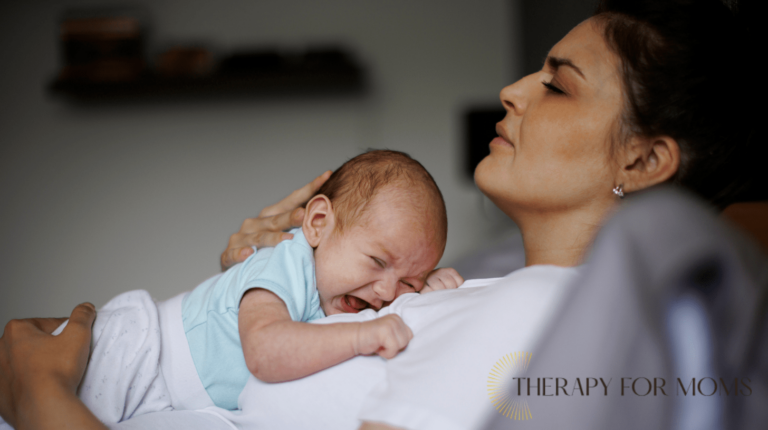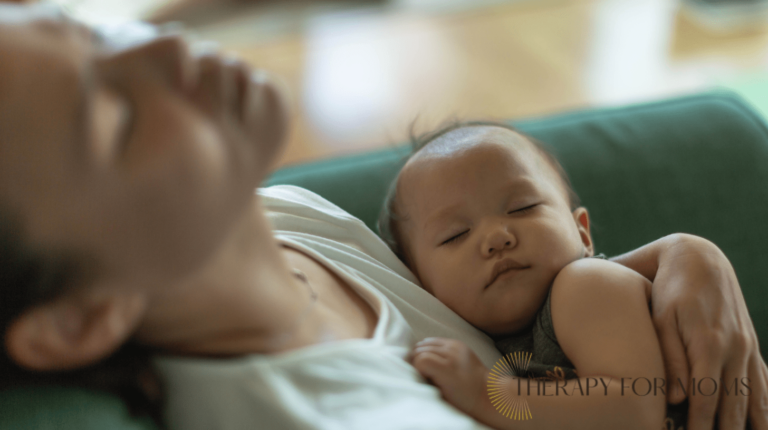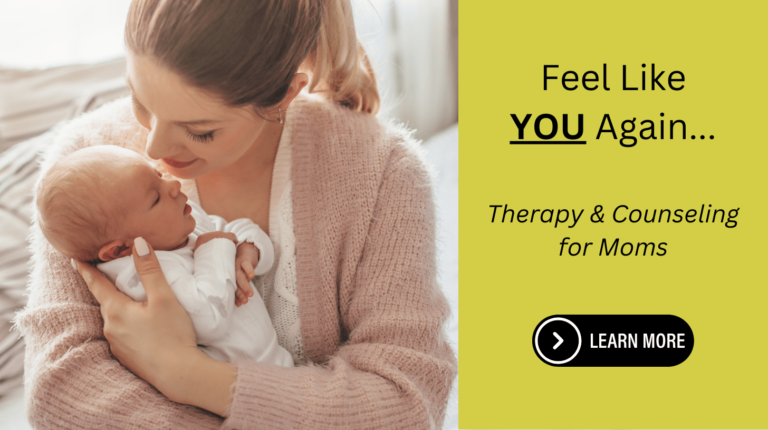
The joyous arrival of a newborn typically ushers in an elated, glorious phase for the family. However, it is not uncommon to encounter challenges after childbirth, some arising as emotional turmoil. One such condition that may loom large over many new mothers is postpartum depression (PPD). While bringing a baby into the world should theoretically be brimming with sunshine and rainbows, for some it brings dark clouds and overwhelming downpours—metaphorical representation of this form of depression.
Much like any maze-like concern, knowledge is our lantern here. By understanding its signs and symptoms, we are one step closer to aiding ourselves or someone close who might be suffering from PPD. So let’s uncover the 10 common symptoms of postpartum depression together.

10 Common Postpartum Depression Symptoms
Exploring the intricate hallways of postpartum depression symptoms can seem overwhelming, especially when you’re uncertain about what to look for. Here, I’ll concisely take you through the ten most standardized patterns typically associated with this seemingly insidious condition.
1) Persistent Sadness or Low Mood
The first evidence of postpartum depression presents as an enduring state of unhappiness or a constantly low mood that overspills regular sadness. This symptom is usually characterized by feelings of emptiness and hopelessness, preceding even during pregnancy hinting towards those stubborn postpartum depression symptoms during pregnancy.
2) Loss of Interest or Pleasure
Another conspicuous sign commonly experienced is a marked loss of interest in activities formerly enjoyed. Even simple pleasures such as reading a book or taking walks may suddenly become burdensome tasks which significantly affects personal contentment levels.
3) Changes in Appetite
This could go two ways; overeating or drastically minimal eating. If you find yourself excessively indulging in food – perhaps more than your usual intake – or completely neglecting to eat even though hunger pangs are alert, it’s advisable to take note as these might be significant markers for postpartum depression symptoms while pregnant.
4) Sleep Disturbances
Sleep changes often manifest in two distinct forms – either incessant sleep (hypersomnia) or persistent insomnia. No matter how fatigued you feel, falling asleep might become an uphill task and even when you do manage to sleep, staying asleep might be another challenge on its own. Yet there are days where all you’ll want to do is remain swaddled up in bed irrespective of anything else happening around.
5) Fatigue or Loss Of Energy
Feeling perpetually tired and drained denotes another warning sign generally connected with postpartum depression – continual fatigue without reason. Completing common tasks or even getting out of bed can become increasingly difficult.
6) Feelings of Worthlessness or Guilt
Being swiped by severe feelings of worthlessness, guilt, and self-blame particularly regarding decisions made during pregnancy or thoughts about motherhood is one striking symptom. Remember this motivational gem from ‘It’s Not Your Fault (NACoA) – “It’s not your fault!“
7) Difficulty Concentrating Or Making Decisions
One less apparent manifestation refers to the challenges faced while trying to focus, concentrate, or make likely simple decisions; creating an unusual indecisiveness that interrupts daily living and functioning.
8) Anxiety
Feeling constantly on edge, panicky without cause even in the face of non-threatening situations multiplies the discomfort accumulated through postpartum depression symptoms.
9) Mood Swings
If you’re experiencing emotional instability characterized by rapid mood shifts ranging from highs (mania) to lows (depression), it might be suggestively more than just hormonal imbalance triggered by childbirth.
10) Thoughts Of Harm
The most dangerous yet invisible symptom relates to recurrent thoughts about harming yourself or your baby. If such ideas keep intruding your head space, it urgently signals a need for professional help.
To fully comprehend these symptoms and understand their diverging manifestations, remember postpartum depression picks no favorites; hence acceptability is paramount towards taking the first step – seeking assistance.

The Causes of Postpartum Depression
Discovering whether you’re experiencing postpartum depression can be a complex journey. Recognizing that it may stem from various factors is essential, and appreciating the underpinning origins could help remedy the burning question: “How do I know if I have postpartum?” So, let’s jump into understanding what might cause this condition.
First off, hormones play a significant role in triggering postpartum depression. Following childbirth, there’s an abrupt drop in hormones such as estrogen and progesterone, which can trigger mood swings leading to depressive symptoms.
Another key factor is physical exhaustion emerging after baby delivery exhaustive procedures or due to lack of sleep associated with caring for your newborn. Fatigue impacts emotional health negatively, making new parents more susceptible to postpartum depression.
Significant life changes following the birth of a child also contribute significantly. The stress and pressure of adapting to parenthood responsibilities can stir feelings of overwhelm and sadness that culminate into this type of depression.
Isolation can be another culprit|-|an often overlooked one at that. New mothers are often confined within their homes for weeks to months after birth, separated from social contact and support networks’ lively interaction. Such isolation could escalate feelings of loneliness partly contributing towards depression onset.
Lastly, some might struggle with pre-existing mental health conditions such as anxiety disorders or bipolar disorders. These prior mental health struggles can increase susceptibility to developing postpartum depression.
Recognize then that multiple threads interweave to form this intricate fabric we call postpartum depression; hormonal shifts after pregnancy, sheer physical fatigue following childbirth experience or because of childcare, daunting parenting burdens accompanied by drastic lifestyle switch-over’s, possible tactical isolation norms experienced during early motherhood stint alongside hues attributable to any earlier existing emotional health challenges — all together sew up the potential causative rationale behind those uncomfortable episodes cropping up while nurturing your precious little bundle!
Remember asking “How do I know if I have postpartum?” earlier? Understanding its causes is the first step towards uncovering whether you’re navigating this valley. Informed, let’s tread lightly and gently ahead!

Where to Get Help?
If you or anyone close to you is displaying signs of postpartum depression, do not hesitate to reach out for help. Professionals in the healthcare sector are well-equipped with knowledge and resources to support those battling this condition.
Contact Therapy For Moms
One of the reliable spaces for help in Houston, Texas is ‘Therapy For Moms‘. They specialize in services for mothers undergoing mental health challenges including postpartum depression. With compassionate therapists who understand the unique complexities of motherhood, they offer therapeutic interventions such as counseling and cognitive-behavioral therapy. Remember that reaching out is your first step towards healing.
How is Postpartum Depression Treated?
Postpartum depression treatment varies according to the severity of symptoms but often includes one or a combination of these: psychotherapy, antidepressant medication, hormone therapy.
- Counseling & Therapy: Also known as talk therapy or psychological therapy can provide effective ways to address postnatal depression. Therapies like Cognitive Behavioral Therapy (CBT) work excellently by helping you manage your thoughts and improve your coping skills.
- Antidepressant Medication: Antidepressants may be prescribed by doctors after carefully examining the risks and benefits related to your individual condition. They function by balancing mood-regulating hormones in your brain.
- Hormone Therapy: In some cases, an estrogen replacement regimen can also counterbalance the rapid drop in estrogen associated with childbirth that seems linked with mood swings.
However, it’s crucial to consult with professional healthcare providers for personalized treatments.
How Long Can Postpartum Depression Last?
The question “how long do postpartum symptoms last” indeed looms large in most people’s minds. According to the American Psychological Association, postpartum depression symptoms typically appear within a few weeks after delivery but can even emerge up until a year later. The duration varies widely among individuals—from months up to a year or sometimes even more. In some cases, untreated symptoms can become chronic and persist even longer.
However, with timely intervention and adequate treatment, most mothers successfully navigate their way out of postpartum depression. The key remains in recognizing symptoms early and taking prompt actions towards seeking help. Always remember that it’s okay to ask for help as every journey towards health starts with one brave step forward.

